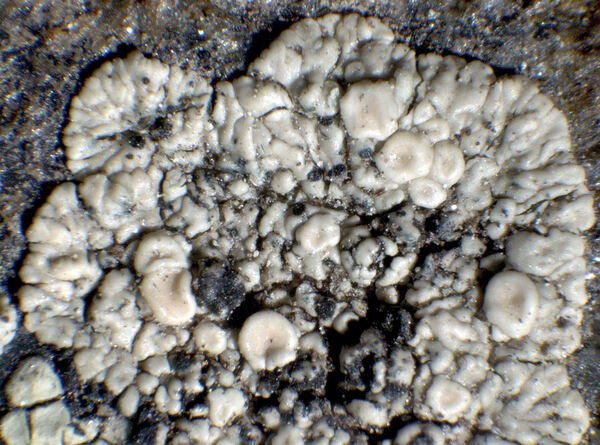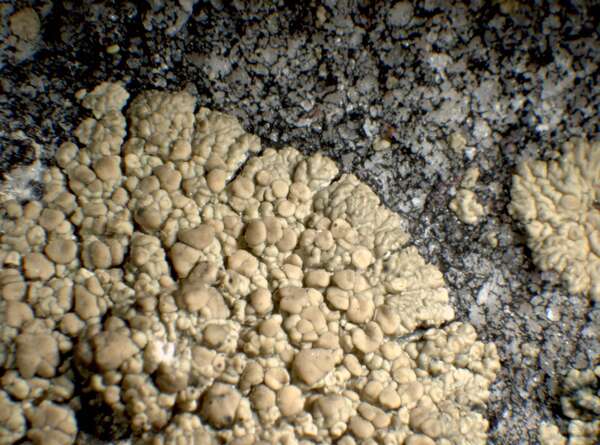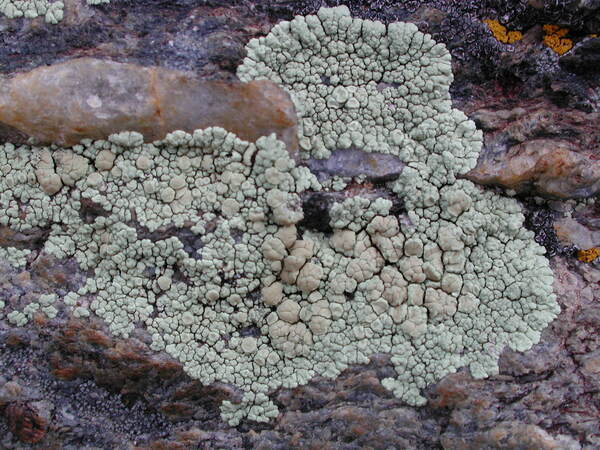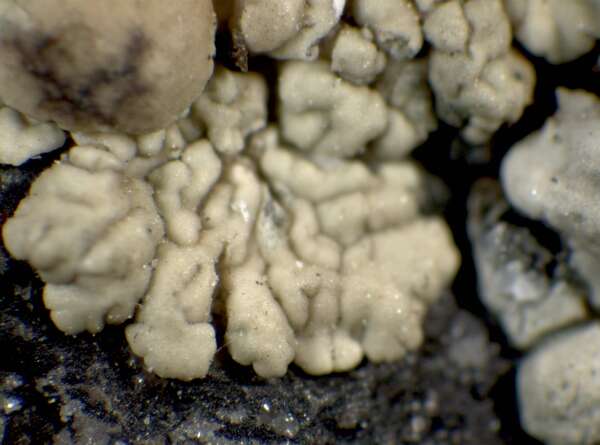Lecanora orbicularis (Schaer.) Vain.
Termeszetr. Füzetek, 22: 286, 1899. Basionym: Lecanora polytropa var. orbicularis Schaer. - Enum. Crit. Lich. Eur.: 81, 1850.
Synonyms: Protoparmeliopsis orbicularis (Schaer.) S.Y. Kondr.
Description: Thallus crustose-placodioid, episubstratic, yellowish green to greenish grey, sometimes bluish grey in central parts, smooth and somewhat shiny, epruinose, forming 0.5-2(-3) cm wide, regular rosettes which often tend to die in central parts. Marginal lobes 1-2(-3) mm long and 0.3-0.5 mm wide, contiguous, flat to convex; central part of thallus of convex to bullate, up to 1 mm wide, contiguous areoles. Cortex c. 25 µm thick, with yellowish grey granules; medulla white, rather lax. Apothecia lecanorine, 0.3-0.5(-0.8) mm across, with an initially flat, then strongly convex, greenish disc and an entire to crenulate, finally excluded thalline margin. Epithecium hardly distinguishable from the hymenium; hymenium colourless to yellowish grey due to diffuse granules, 50-70 µm high, inspersed with oil droplets in upper part; paraphyses sparingly branched and anastomosing, slightly thickened at apex; hypothecium colourless. Asci 8-spored, clavate, very thin-walled, with a K/I+ blue, tall tholus penetrated by a faintly amyloid apical cushion, the wall K/I-, surrounded by a blue outer layer, Lecanora-type. Ascospores 1-celled, hyaline, ellipsoid, (6-)8-11(-13.5) x (4-)5.5-7(-8) µm. Photobiont chlorococcoid. Spot tests: thallus K- or K+ indistinctly brownish yellow, C-, KC+ pale yellow, P-. Chemistry: thallus with usnic, rangiformic and norrangiformic acids.
Growth form: Crustose
Substrata: rocks
Photobiont: green algae other than Trentepohlia
Reproductive strategy: mainly sexual
In underhangs rarely wetted by rain
Commonnes-rarity: (info)
Alpine belt: rather rare
Subalpine belt: rare
Montane belt: absent
Dry submediterranean belt: absent
Humid submediterranean belt: absent
Padanian area: absent
pH of the substrata:
1 2 3 4 5
Solar irradiation:
1 2 3 4 5
Aridity:
1 2 3 4 5
Eutrophication:
1 2 3 4 5
Poleotolerance:
0 1 2 3
Altitudinal distribution:
1 2 3 4 5 6
Rarity
absent
extremely rare
very rare
rare
rather rare
rather common
common
very common
extremely common
Loading data...
Occurrence data
Predictive map
Growth form: Crustose
Substrata: rocks
Photobiont: green algae other than Trentepohlia
Reproductive strategy: mainly sexual
In underhangs rarely wetted by rain
Commonnes-rarity: (info)
Alpine belt: rather rare
Subalpine belt: rare
Montane belt: absent
Dry submediterranean belt: absent
Humid submediterranean belt: absent
Padanian area: absent
pH of the substrata:
| 1 | 2 | 3 | 4 | 5 |
Solar irradiation:
| 1 | 2 | 3 | 4 | 5 |
Aridity:
| 1 | 2 | 3 | 4 | 5 |
Eutrophication:
| 1 | 2 | 3 | 4 | 5 |
Poleotolerance:
| 0 | 1 | 2 | 3 |
Altitudinal distribution:
| 1 | 2 | 3 | 4 | 5 | 6 |
Rarity
absent
extremely rare
very rare
rare
rather rare
rather common
common
very common
extremely common
Loading data...
Occurrence data
Predictive map










